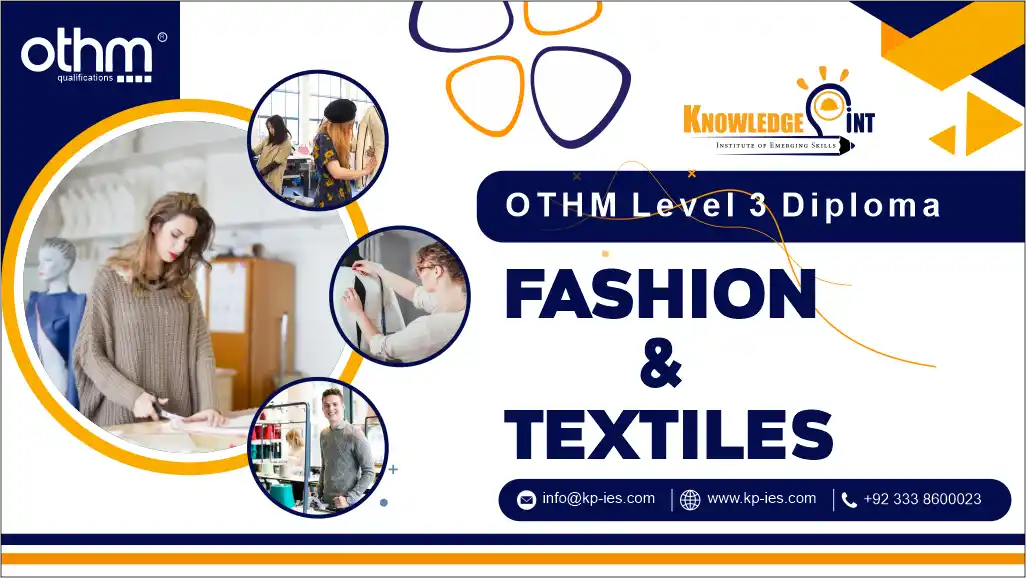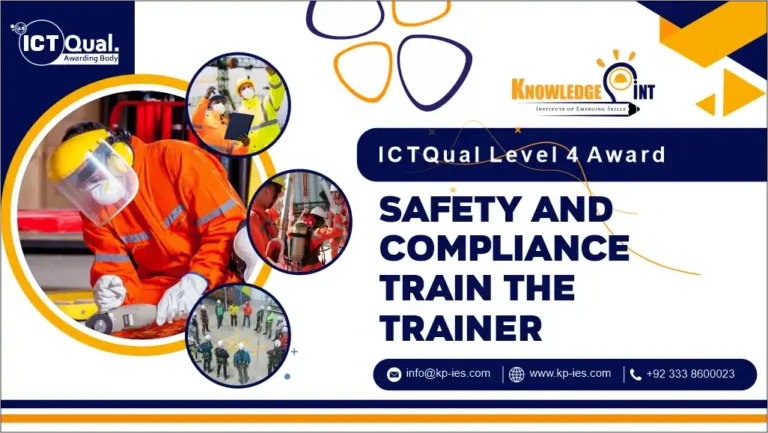Fashion is more than just clothes; it’s a form of art, a means of self-expression, and a vibrant industry that continually evolves. For those passionate about making their mark in the world of fashion and textiles, the OTHM Level 3 Diploma in Fashion and Textiles offers an ideal starting point. This diploma is designed to provide aspiring fashion enthusiasts with the foundational knowledge and skills necessary to thrive in this dynamic industry.
The OTHM Level 3 Diploma in Fashion and Textiles is a comprehensive program that introduces students to the fundamental aspects of fashion design, textiles, and garment production. This course serves as an excellent stepping stone for individuals looking to enter the fashion industry or pursue further studies in fashion and textiles.
The OTHM Level 3 Diploma in Fashion and Textiles offers an exciting opportunity for aspiring fashion professionals to embark on their journey in the fashion industry. By providing a strong foundation in both theoretical knowledge and practical skills, this diploma sets the stage for a successful and fulfilling career in fashion and textiles. Whether your dream is to become a fashion designer, textile technician, or fashion illustrator, this program equips you with the essential tools to turn your passion into a profession.
Course Overview
The OTHM Level 3 Diploma in Fashion and Textiles consists of 5 mandatory units which are as follows.
The future progression of the OTHM Level 3 Diploma in Fashion and Textiles can lead learners towards several pathways, depending on their career goals and aspirations in the field of law and related sectors. Here are some potential avenues of progression:
Introduction to Fashion and Textiles Techniques and Processes
- Fundamental Knowledge:
- Understand the basic concepts, terminology, and historical context of fashion and textiles.
- Identify various types of textiles and their properties, including natural and synthetic fibers.
- Textile Techniques:
- Gain proficiency in fundamental textile techniques such as weaving, knitting, dyeing, and printing.
- Learn the processes involved in textile production from raw material to finished fabric.
- Garment Construction:
- Develop skills in basic garment construction techniques, including pattern making, cutting, and sewing.
- Understand the role of quality control in the production process to ensure the creation of high-quality garments.
- Sustainable Practices:
- Explore sustainable practices in fashion and textiles, including eco-friendly materials and ethical production methods.
- Evaluate the environmental impact of different textile processes and seek ways to minimize waste and pollution.
Ideas Generation in Fashion and Textiles
- Creativity and Concept Development:
- Cultivate creativity and innovation in developing original fashion and textile concepts.
- Explore various sources of inspiration, including cultural, historical, and contemporary influences.
- Research and Analysis:
- Conduct research to support the development of fashion and textile ideas, including trend analysis and market research.
- Analyze and interpret findings to inform and refine creative concepts.
- Idea Presentation:
- Develop skills in presenting ideas visually and verbally, including sketching, mood boards, and storyboards.
- Communicate effectively with peers, mentors, and industry professionals to receive feedback and improve concepts.
- Collaboration and Teamwork:
- Engage in collaborative projects to generate and develop ideas, leveraging diverse perspectives and skill sets.
- Develop teamwork and interpersonal skills essential for working in the fashion and textiles industry.
Design and Innovation
- Design Principles:
- Understand fundamental design principles, including color theory, composition, and balance.
- Apply these principles to create innovative and aesthetically pleasing fashion and textile designs.
- Technical Skills:
- Develop technical skills in digital and manual design techniques, including CAD software and traditional drawing methods.
- Experiment with different materials and techniques to push the boundaries of conventional design.
- Prototype Development:
- Translate design concepts into tangible prototypes, from initial sketches to finished products.
- Iterate and refine prototypes based on feedback and testing, ensuring functionality and aesthetic appeal.
- Innovation and Trends:
- Stay informed about current trends and technological advancements in the fashion and textiles industry.
- Integrate innovative approaches and technologies into design projects to create forward-thinking solutions.
Fashion and Textiles Realisations
- Project Planning and Management:
- Develop project management skills to plan, execute, and complete fashion and textile projects.
- Create timelines, budgets, and resource plans to ensure projects are completed on time and within scope.
- Technical Execution:
- Demonstrate proficiency in executing fashion and textile designs, from concept to final product.
- Utilize advanced construction techniques and tools to produce high-quality garments and textiles.
- Quality Control and Evaluation:
- Implement quality control measures to assess and improve the final product.
- Evaluate completed projects based on design objectives, functionality, and customer feedback.
- Presentation and Marketing:
- Develop skills in presenting and marketing fashion and textile products to potential clients and stakeholders.
- Create professional portfolios, lookbooks, and marketing materials to showcase work effectively.
Personal and Professional Development in the Apparel Industry
- Career Planning:
- Identify personal career goals and create a strategic plan for achieving them within the apparel industry.
- Explore different career paths and opportunities, including design, production, marketing, and merchandising.
- Industry Knowledge:
- Gain a comprehensive understanding of the apparel industry, including its structure, key players, and current trends.
- Stay updated on industry developments, technological advancements, and emerging markets.
- Professional Skills:
- Develop essential professional skills, including communication, networking, and project management.
- Cultivate a professional attitude, work ethic, and commitment to continuous learning and improvement.
- Portfolio Development:
- Create a professional portfolio that showcases personal strengths, skills, and achievements.
- Learn how to effectively present and market oneself to potential employers, clients, and collaborators.
These learning outcomes provide a comprehensive framework for students to develop the necessary skills and knowledge to thrive in the fashion and textiles industry. By mastering these key areas, individuals will be well-equipped to innovate, create, and excel in their careers, contributing to the ever-evolving world of fashion and textiles.
Course Benefits of the OTHM Level 3 Diploma in Fashion and Textiles :
1. Specialized Expertise
- Auditing Proficiency: Gain specialized knowledge and skills in auditing energy management systems according to the ISO 50001:2018 standard.
- Industry Recognition: Earn a globally recognized qualification that demonstrates your proficiency as an energy management systems auditor.
2. Career Advancement
- Expanded Career Opportunities: Qualify for roles such as Lead Energy Auditor, Energy Management Consultant, or Compliance Officer.
- Higher Earning Potential: Enhance your value to employers and increase your earning potential with specialized expertise in energy management auditing.
3. Industry-Relevant Skills
- Practical Application: Acquire practical skills and techniques for planning, conducting, and documenting energy management system audits.
- Effective Communication: Develop communication skills to interact with auditees, audit teams, and stakeholders effectively.
4. Contribution to Sustainability
- Promotion of Energy Efficiency: Play a key role in promoting energy efficiency and reducing environmental impact within organizations.
- Support for Sustainable Practices: Assist organizations in implementing and maintaining energy management systems that support sustainability goals.
5. Quality Assurance
- Compliance Assurance: Help organizations achieve compliance with ISO 50001:2018 requirements and other relevant regulatory standards.
- Risk Mitigation: Identify areas of non-conformance and provide recommendations for corrective actions to mitigate risks.
6. Continuous Professional Development
- Lifelong Learning: Engage in continuous professional development by staying updated with the latest developments and trends in energy management auditing.
- Networking Opportunities: Connect with industry professionals, auditors, and experts, expanding your professional network and opportunities.
7. Organizational Benefits
- Improved Performance: Contribute to the improvement of organizational energy performance through effective auditing and recommendations for continuous improvement.
- Enhanced Reputation: Help organizations build a positive reputation for their commitment to energy management and sustainability practices.
8. Personal Growth
- Leadership Development: Develop leadership skills to effectively manage audit teams, delegate tasks, and ensure audit objectives are met.
- Confidence Boost: Gain confidence in your abilities as an energy management systems auditor through practical training and hands-on experience.
Completing the OTHM Level 3 Diploma in Fashion and Textiles opens up numerous pathways for further education and career development. Here are some potential future progressions for graduates of this course:
Academic Advancement
- Level 4 and 5 Diplomas in Fashion and Textiles:
- Progress to higher-level diplomas to gain deeper knowledge and more advanced skills in fashion design, textile technology, and garment production.
- Bachelor’s Degree Programs:
- Pursue undergraduate studies in Fashion Design, Textile Design, Fashion Marketing, or related fields to expand your theoretical knowledge and practical expertise. Potential degree programs include:
- BA (Hons) Fashion Design
- BA (Hons) Textile Design
- BA (Hons) Fashion Marketing and Management
- BA (Hons) Fashion Merchandising
- Pursue undergraduate studies in Fashion Design, Textile Design, Fashion Marketing, or related fields to expand your theoretical knowledge and practical expertise. Potential degree programs include:
- Master’s Degree Programs:
- After completing an undergraduate degree, consider pursuing postgraduate studies to specialize further and enhance career prospects. Potential master’s programs include:
- MA Fashion Design
- MA Textiles
- MA Fashion Marketing
- MBA in Fashion Management
- After completing an undergraduate degree, consider pursuing postgraduate studies to specialize further and enhance career prospects. Potential master’s programs include:
Professional Development
- Entry-Level Positions:
- Start your career in various entry-level roles within the fashion industry to gain practical experience. Potential positions include:
- Assistant Fashion Designer
- Textile Technician
- Fashion Illustrator
- Retail Fashion Assistant
- Junior Pattern Maker
- Start your career in various entry-level roles within the fashion industry to gain practical experience. Potential positions include:
- Internships and Apprenticeships:
- Gain hands-on experience and industry exposure through internships and apprenticeships with fashion brands, design houses, textile manufacturers, and retail companies.
- Professional Certifications and Short Courses:
- Enhance your skills in specific areas by pursuing professional certifications or short courses. Examples include:
- Certificate in Fashion Illustration
- Certificate in Digital Textile Design
- Short Course in Pattern Making and Draping
- Workshop in Sustainable Fashion Practices
- Enhance your skills in specific areas by pursuing professional certifications or short courses. Examples include:
Specialized Career Paths
- Fashion Design and Development:
- Continue to develop your skills as a fashion designer, focusing on creating original collections and innovative designs.
- Textile Technology and Innovation:
- Specialize in textile technology, working on developing new materials, sustainable fabrics, and advanced textile techniques.
- Fashion Marketing and Merchandising:
- Pursue a career in fashion marketing, brand management, or merchandising, focusing on promoting fashion products and analyzing market trends.
- Fashion Entrepreneurship:
- Start your own fashion label or business, leveraging your skills and knowledge to create and market your own products.
Networking and Industry Engagement
- Professional Associations and Networks:
- Join professional associations and networks in the fashion and textiles industry to connect with peers, mentors, and potential employers. Examples include:
- Council of Fashion Designers of America (CFDA)
- The Textile Institute
- British Fashion Council (BFC)
- Join professional associations and networks in the fashion and textiles industry to connect with peers, mentors, and potential employers. Examples include:
- Fashion Shows and Competitions:
- Participate in fashion shows, exhibitions, and design competitions to showcase your work, gain recognition, and build your professional portfolio.
- Conferences and Workshops:
- Attend industry conferences, seminars, and workshops to stay updated on the latest trends, technologies, and best practices in fashion and textiles.
The OTHM Level 3 Diploma in Fashion and Textiles provides a solid foundation for a rewarding career in the fashion industry. By pursuing further education, gaining practical experience, and staying engaged in professional development, graduates can explore diverse career opportunities and make significant contributions to the ever-evolving world of fashion and textiles. Whether your passion lies in design, textiles, marketing, or entrepreneurship, this diploma sets you on a path to success in the vibrant and dynamic fashion industry.







